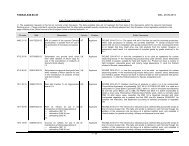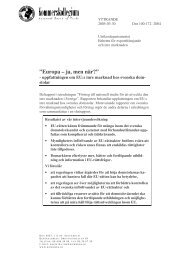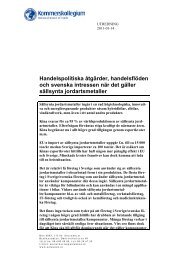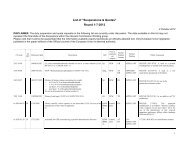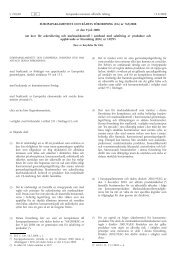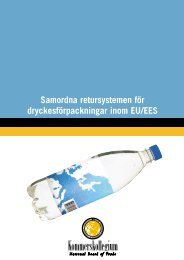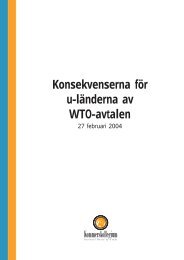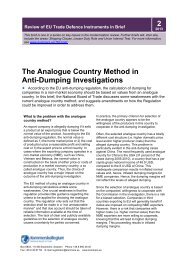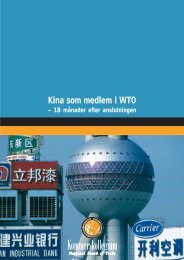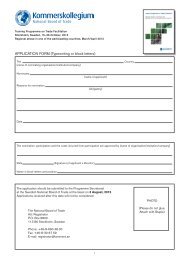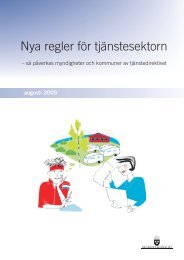Trade Facilitation - Impact and Potential Gains - Kommerskollegium
Trade Facilitation - Impact and Potential Gains - Kommerskollegium
Trade Facilitation - Impact and Potential Gains - Kommerskollegium
- No tags were found...
You also want an ePaper? Increase the reach of your titles
YUMPU automatically turns print PDFs into web optimized ePapers that Google loves.
1 IntroductionThe importance of trade as a tool for economic development st<strong>and</strong>s uncontestedin economic theory. <strong>Trade</strong> currently represents 30 percent of world GDP <strong>and</strong> isestimated to grow to 50 percent by 2020. The importance of efficiency in trade isespecially important for smaller <strong>and</strong> more trade dependent countries such asSweden, where trade in relation to GDP is twice as important as in France <strong>and</strong>four times as important as in the US.The facilitation of trade procedures is seen by all major international organisationsas vital for economic development, not least for developing countries. <strong>Trade</strong>procedures are perceived to be a future bottleneck <strong>and</strong> there are many factors thatare fuelling the need for trade facilitation. The foremost factors are:• The large increase in international trade• The explosive IT-development, which has lead to faster, cheaper <strong>and</strong> moreefficient modes of trade <strong>and</strong> transport systems (such as Just-In-Time (JIT)management <strong>and</strong> electronic commerce)• The rapid increase in bilateral <strong>and</strong> regional free-trade agreements that oftenfeature complex Customs requirements (i.e. rules of origin)• The significant change in the nature of internationally traded goods (fromcomplete goods towards intermediate <strong>and</strong> sub-assembled products)• The increase in the comparative cost of cumbersome <strong>and</strong> anachronistic tradeprocedures, as a result of the extensive work <strong>and</strong> progress done on othertrade liberalising issues, such as tariff <strong>and</strong> quota reductions.The World Bank regards trade facilitation as an essential component for overallsuccess in economic growth <strong>and</strong> development 1 <strong>and</strong> the UN estimates the potentialsavings from trade facilitation to be of some US$490,000,000,000. 2 This sum is adeadweight loss <strong>and</strong> comes neither the government, the companies nor theindividual citizens in h<strong>and</strong>.The magnitude of the possible gains has led to the issue of trade facilitation beingincluded in the WTO framework.<strong>Trade</strong> procedures refers, in their most basic sense, to all the processes <strong>and</strong> workinvolved in fulfilling the administrative work <strong>and</strong> information processing requiredfor the movement of goods in international trade. There are of course severaltypes of formalities, procedures <strong>and</strong> paperwork that are necessary in order forgovernments <strong>and</strong> industry to conduct, monitor <strong>and</strong> control the movements ofgoods <strong>and</strong> for safeguarding every part’s legitimate interest. However, the fulfillingof an overwhelming amount of unnecessary regulations, rules, proceduralrequirements <strong>and</strong> administration constitutes a de facto cost that is beneficial tonone.The increase in security-consciousness further amplifies the need for bettermanaged<strong>and</strong> more transparent trade <strong>and</strong> customs procedures.1World Bank, 2001. ”<strong>Trade</strong> <strong>and</strong> Transport <strong>Facilitation</strong> – a Toolkit for Audit, Analysis, <strong>and</strong> RemedialAction.” Page v.2Presentation by Mike Doran at the UN/CEFACT BPAWG meeting in Geneva 3 December 2001.5



